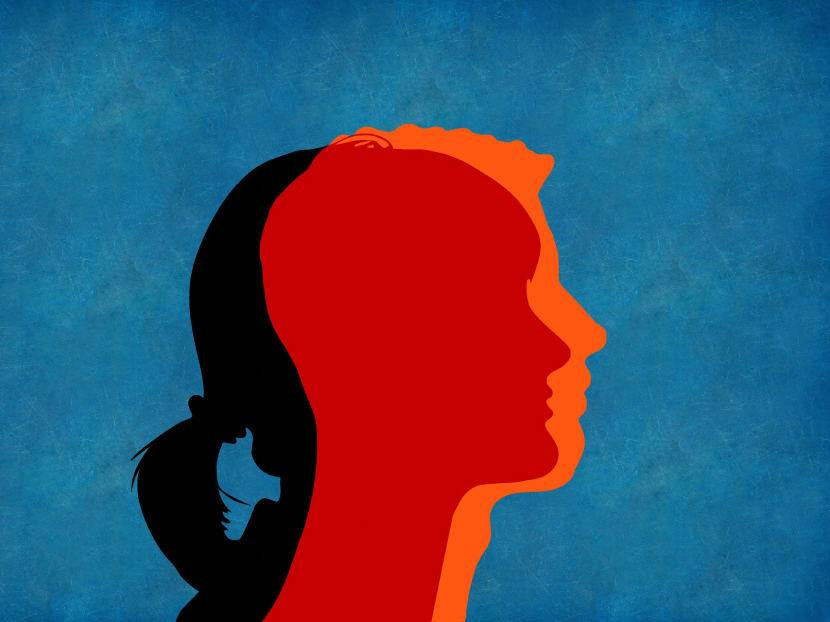Living with gender dysphoria: Transgender youths face stigma and inadequate institutional support
SINGAPORE — Even though information about transgender issues has proliferated across the internet and become more accessible, people in Singapore who are diagnosed with gender dysphoria still find it difficult to find resources here and get adequate medical treatment and acceptance, experts and transgender youth said.

While healthcare accessibility has improved over the years, non-governmental organisations that support transgender people said that gaps still remain.
- At a time when many social taboos have been shed, the stigma around transgender issues still remains
- There is inadequate institutional support for young people with gender dysphoria, observers said
- Some of these youth have resorted to buying hormones online to transition, which doctors warn can be dangerous
- NGOs said more can be done to educate the public on transgender issues
SINGAPORE — Even though information about transgender issues has proliferated across the internet and become more accessible, people in Singapore who are diagnosed with gender dysphoria still find it difficult to find resources here and get adequate medical treatment and acceptance, experts and transgender youth said.
Gender dysphoria refers to the psychological discomfort or distress experienced by an individual who believes that there is a mismatch between his or her sex and his or her gender identity.
Non-governmental organisations (NGOs) that support transgender people told TODAY that gaps still remain, even though healthcare accessibility has improved over the years. Many healthcare professionals still lack the knowledge to treat transgender people, and public information about the resources available remain scarce and inaccessible, they said.
Transgender youth who were interviewed said that they face inadequate support at home and in school, and struggle to gain acceptance.
Unlike many other social taboos that have been shed, the taboo associated with transgender issues is still there and it has contributed to some of these problems, the NGOs said.
They added that this stigma and the inadequate institutional support is damaging to students with gender dysphoria, some of whom have even resorted to buying hormone replacement pills from unauthorised websites.
These gaps were thrust under the spotlight two months ago, when a transgender student named Ashlee alleged that the Ministry of Education (MOE) had prevented her from obtaining a doctor’s referral letter to begin hormone replacement therapy, the treatment recommended for individuals diagnosed with gender dysphoria.
In a 2016 study by medical journal The Lancet, estimates suggested that about 0.3 to 0.5 per cent of the global population are transgender. There is no official estimate of the number of transgender people among Singapore’s population.
HEALTHCARE ACCESSIBILITY
Opened in 2017, the Gender Health Clinic under the Institute of Mental Health (IMH) is believed to be the only public hospital in Singapore to have a team of medical professionals specialised in treating the transgender community, after the gender identity clinic at National University Hospital closed in 2008.
Transgender patients who wish to seek help from the clinic can get a referral through public hospitals or polyclinics.
However, Transgender SG, an organisation that collates resources for the transgender community in Singapore, said that getting this referral is not that straightforward, because many public healthcare workers do not know what to do when a person with gender dysphoria approaches them.
This was the case for Kaeden Lim, 17, who sought professional medical support from regular psychiatrists at a public hospital when he was 12 due to struggles with gender dysphoria and his mental health.
It took more than a year and four psychiatrists before he was finally referred to IMH’s Gender Health Clinic.
TODAY spoke to Kaeden’s parents, who confirmed that Kaeden is a patient at the gender clinic and was diagnosed with gender dysphoria in 2018.
The teenager recalled how even after he had told the doctors that he identifies as a transgender male, they continued to use female pronouns when addressing him.
It was only at the IMH Gender Health Clinic that Kaeden received the support he was looking for when a doctor at the clinic validated his experience as a transgender person.
All three transgender students whom TODAY interviewed said that their experience at the gender clinic was affirming and positive.
Their frustration, though, lies with having to wait around three months between appointments because there are only a handful of doctors servicing the clinic.
When contacted about the issue, IMH declined to comment.
There are options available for patients to go to a private doctor for medical support, but many choose not to because the prices for private consultations can be up to two to four times higher than public consultations.
Professor Tsoi Wing Foo, a psychiatrist in private practice who has treated patients with gender dysphoria for 50 years, said that some patients choose to go to him for treatment first while waiting for an appointment in the public hospital, which can take a few months.
Since 2007, he has seen 1,000 patients with gender dysphoria. Most of his patients are between the ages of 18 and 30.
The young people interviewed by TODAY said what makes matters worse is that information and resources for healthcare support is not easily accessible.
For instance, they found out about how to get a referral to the IMH gender clinic through a private online community and the information was not available publicly.
Transgender SG has a list of healthcare providers that cater to transgender people, but it does not make this information public due to fears of societal backlash.
LACK OF SOCIAL SUPPORT
Then, there are some young transgender people who are unable to begin hormone replacement therapy due to lack of support from family.
This was the case for Lexi (not her real name), who was diagnosed with gender dysphoria in 2019.
Lexi let TODAY see the appointment cards, receipts and correspondence from a hospital showing that she is a patient at the IMH Gender Health Clinic and has been diagnosed with gender dysphoria.
In Singapore, individuals below 21 have to get permission from their parents before they can be referred to an endocrinologist, who specialises in treating conditions related to hormones and hormonal glands.
Because Lexi’s parents are against her medically transitioning, the 18-year-old has resorted to buying hormone pills off unauthorised websites without a prescription. She relies on the accounts of other transgender women to figure out how much to take.
The NGOs told TODAY that this is a common occurrence within the community for those who do not have support to transition but are desperate to start the process.
Doctors are warning that buying and using hormones from websites can be dangerous.
Dr Abel Soh, an endocrinologist at Mount Elizabeth Hospital, said that there are many unbranded hormone treatments available online that may not necessarily provide the same concentration of hormones stated.
Taking hormones without monitoring their levels in the blood via blood tests may potentially result in excessive usage, he said.
Agreeing, Dr Ben Ng from Arden Endocrinology Specialist Clinic said that gender transitioning is a complex and multi-pronged process. Professional evaluation from a medical doctor is necessary to ensure that the therapy prescribed is appropriate and safe.
Both specialists said that taking the wrong prescription of hormones could lead to significant health problems, including increased risk of blood clots, heart disease and stroke.
Even when transgender students have family support, they might feel alienated in school because the institutions often are not equipped to help them, the patients and experts said.
For instance, students face hurdles over which uniform they can wear or which toilets they can use.
This was the case for junior college student Jules (not her real name), who started hormone replacement therapy last year.
TODAY confirmed with Jules’ parents that she was diagnosed with gender dysphoria and is seeing a doctor at the IMH Gender Health Clinic.
During a disagreement with the school over which uniform she should wear, the 18-year-old was asked to wear a lab coat over her physical education attire during science practical class.
Jules said that this has made her feel more anxious because she now stands out among her peers, who wear either long pants or skirts during these lessons.
She has also resorted to drinking as little water as possible and holding her bladder to avoid using the bathroom in school.
“If I could describe it in one sentence, it’s like I’m going out with an extremely bad haircut every day… just constantly being self-conscious because of this issue,” she said.
WHAT NGOS, TEACHERS AND PARENTS SAY
To deal with the lack of social support in schools, NGOs said that teachers need to address matters of gender identity and sexuality in the classroom so that students are aware and know how to treat their peers facing gender dysphoria with more empathy and compassion.
Mr Ryzqiin Rafah said that this can be done through sexuality education. The 46-year-old is a volunteer with the TransBefrienders, a peer support service for transgender youth in Singapore.
The group has started a study support scheme for transgender students who have dropped out of school for various reasons, including bullying and lack of support.
To help teachers better navigate transgender issues in school, Mr Rafah said that schools may invite LGBTQ (lesbian, gay, bisexual, transgender and queer) organisations such as Oogachaga or The T Project to guide teachers on how to navigate sensitive topics.
Ms June Chua, the founder of transgender shelter The T Project, said that schools should implement a zero-tolerance bullying policy so that all students have a safe and inclusive learning environment.
This could include ensuring that transgender students who experience any kind of bullying can approach trusted school counsellors, who have a set of protocols on how to handle such cases.
“Schools should be a safe space for all students regardless of whether they are transgender or not,” Ms Chua said.
A former educator who wanted to be known only as V Loh, 51, agreed that teachers and school counsellors should receive specialised training so that they are better equipped to help students navigate gender issues.
She suggested that school counsellors collaborate with medical professionals who are specialised in treating patients with gender dysphoria, so that they have the knowledge and skills needed to handle such cases.
Ms Loh, who left the school system three years ago, said that these policy changes still need to come from the top, and gender and sexuality issues remain a taboo in the school environment.
MOE, which issued public statements on Ashlee’s case including a joint statement with IMH, said in response to TODAY’s queries that it does not have anything to add on the issue.
Education Minister Lawrence Wong said in Parliament last month that schools can exercise flexibility and work out practical arrangements for students with gender dysphoria, where there are valid medical grounds.
“For students with gender dysphoria, our main focus is continuing to provide them with a conducive learning environment and to support their overall well-being. Recognising that the issues are complex, and that there are diverse opinions among students and their parents, we strive to deal with these situations sensitively and with compassion,” Mr Wong said.
Kaeden’s father, Mr Victor Lim, 59, who is semi-retired and runs a small business, said that the schools his son attended could have been more accepting and accommodating of his son’s needs at the time.
Kaeden had experienced taunts and bullying from peers and teachers when he came out as transgender. He has since left the public school system and is studying at an international school.
“I can imagine if the school had accepted him from the beginning and nurtured him amid all of this to focus on what he is good at… he (would have fared better).”








